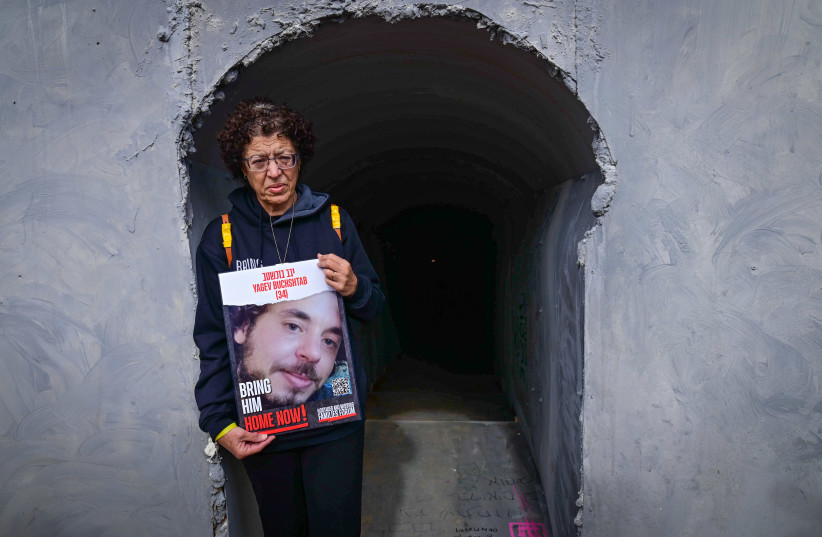Should children visit Hostages Square in Tel Aviv? The question recently came up in an adult dinner conversation among Israelis in Jerusalem.
Let’s think about what a stressful time the children of Israel have been experiencing since the war began. Running from rockets. Parents and siblings on the battlefronts. Evacuation from their homes. Disruption of schooling. Death announcements. Images of kidnapped children.
Will they be missing an empowering, historic experience by not visiting Hostages Square or will it compound their traumas?
My own children are all adults and parents themselves. Still, I thought back to our experiences of bringing them up in Israel. When they were in kindergarten, in the playground they were already talking about the Holocaust. My daughter told me that a friend insisted that her grandmother had seen an angel. “When was that exactly?” I remember asking carefully. “While we were on the swings,” she said. “I explained that I wondered where the angel had been seen. “The angel saved her in the Holocaust,” said my own five-year-old. The small children, it seems, were comparing Holocaust stories they’d heard or overheard at home. I realized that I needed to explain about the Holocaust and, when my children were a little older, to visit Yad Vashem.
Then, in 1987, our older children, aged 10 and 11, were following the trial of concentration camp guard John Demjanjuk while it was taking place in Jerusalem. That needed more discussion. In the 1990 Gulf War, our children wore gas masks and hustled to what we called “a sealed room,” which back then meant the room with the fewest windows. The glass in the windows was protected from shattering with masking tape, and the room was stocked with reassuring chocolate bars. I tried to make them feel that the situation was under control and they were relatively safe.

Wrestling with the question of Hostages Square, I phoned my now-grown-up daughter, Hadas Schroeder Rahamim, of the angel story. She’s a child psychologist, a mother of four, and a sensible person. It was hard for her to hear me on her cellphone. Where was she? At Hostages Square with several of her children.
WE TALKED about it in depth later. Hadas was at Hostages Square with two teenage daughters, one of whom has been especially involved in hostage release activism, ever since her closest friend’s big brother Hersh Goldberg-Polin was abducted. Going to Hostages Square on a weekly basis has become part of that granddaughter’s routine, and Hadas went to support her, as well as the hostages. Hadas’s oldest daughter is in the army, and she decided not to take her eight-year-old son.
In addition to the tents, displays, and installations – the most famous of which is the long, empty set Shabbat table with yellow flowers – relatives and loved ones tell their stories,
“Being there was tough for everyone,” Hadas said. “Several of the speakers told intensely emotional stories that would be very scary for children to hear. Each story is graphic and describes unbearable suffering. How else to break through the wall of a seemingly indifferent world?
“Nowadays, children are much more exposed to information than we were as children. This makes our ability to intervene to frame the information very, very difficult. But if one thing is sure, parents have to be preemptive. We can’t wait for our children to come to us. We need to try to mediate all the frightening information, true or fake, that they’re hearing.”
So start by asking them what they’ve heard and answering truthfully, but in age-appropriate ways, she advises.
“Share information without embellishing it. Allow the kids to express their feelings and validate the feelings. This isn’t easy; kids are going through a lot of emotional pain, and listening and validating can be hard for parents as well. More importantly, it isn’t a one-time conversation. It’s a process that will be repeated many times, and the goal is to keep open a route of communication. Our job is to help our kids regulate themselves so they’re not overwhelmed with everything that’s going on. Knowing their parents will listen and support them through painful feelings helps kids develop their coping skills.”
EXPERIENCING HOSTAGES SQUARE would have been too hard for her eight-year-old, but she likes the way his school has projects around this ongoing tragedy. “A small child might be involved in tying yellow ribbons without hearing all the details. Some kids ask about the Bibas children who are still being held captive, and are comforted to know that the Bibas children are with their mother,” she said.
Teens, on the other hand, need to be involved in healthy volunteer activities; that’s how they express themselves.
“We have to let them connect to the situation. But Hostages Square might not be right for them all. For example, on the 100th day, a young woman sat screaming in a cage as part of the art exhibition. It was very effective, but too strong for some youngsters.”
Of course, their personal experiences and sensitivities also matter. Among those at the adult dining table at which the subject came up were parents who had managed to escape with their children from the attack on October 7. The mother was shot and is in rehabilitation, together with her brother-in-law, who was gravely wounded fighting in Gaza.
Should these children go to Hostages Square?
Said Hadas: “Many children in Israel have lived through our worst nightmares and were exposed to horror beyond words. To them and their families, Hostages Square might feel like a supportive environment where their real-life experiences are being talked about. It’s no longer about shoulds and musts and more about acceptance that the pain needs a place, be it a support circle, a square, or a hug.” ■
The writer is the Israel director of public relations at Hadassah, the Women’s Zionist Organization of America. Her latest book is A Daughter of Many Mothers.
